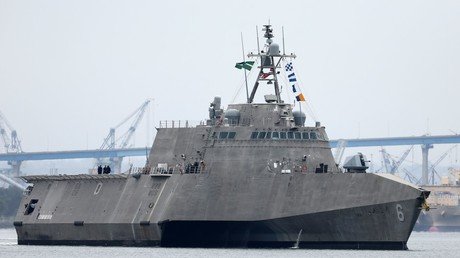US media’s love affair with war: Major outlets showed zero opposition to Syria strikes

Media cheerleading for foreign conflict is nothing new. Coverage of President Trump’s latest airstrikes on Syria was no different, with no major newspaper’s editorial board opposing the strikes, according to a survey.
"Trump was right to strike Syria," read the Washington Post. "One night’s good work," read the New York Post. "We should feel proud as Americans. We did the right thing in Syria," read the Toledo Blade.
The editorial board at the St. Louis Post-Dispatch were rabid in their calls for total armageddon, in an article that read: "The response must not be limited to a single strike like the one a year ago. This time, it should be sustained and punishing, not just to get Assad’s attention but also that of Iran, Hezbollah and, most importantly, Russia."
"Any dictator would admire the uniformity and obedience of the U.S. media". --Noam Chomsky https://t.co/MUaVnUEnVw
— Jimmy Dore (@jimmy_dore) 19 апреля 2018 г.
Trump, the president who once vowed to “bomb the sh*t out of” Islamic State (IS, formerly ISIS) but refrain from entering into regime-change adventures around the world, spent over $125 million launching Tomahawk missiles at government targets in Syria last weekend, with the cooperation of Britain and France. The attack on Syria was launched without congressional or UN approval.
Out of 26 newspaper editorials on the strikes, Fairness and Accuracy in Reporting (FAIR) found no dissenting voices. The New York Times quibbled about the lack of approval, but did not disagree with the strikes. “It was reassuring,” the board wrote, that the airstrikes were carried out in coordination with Britain and France.
The fact that Assad’s government had not yet been internationally proven responsible for the attacks mattered little. Nor did the historic consequences of foreign intervention based on social media evidence, which saw the US spend over a decade and a trillion dollars in Iraq.
READ MORE: Why ‘think tanks’ lobby for war in Syria
Major US newspapers love war. When Trump ordered a Tomahawk missile strike on a Syrian airfield last year, FAIR found that out of 47 editorials, only one opposed the action. The editorial board of the Denver Post was especially giddy at the prospect of conflict, writing: “The US decision to launch cruise missiles at Syrian President Bashar Assad’s airfield felt good.” So too were the editors at the New York Times, who wrote: “It was hard not to feel some sense of emotional satisfaction.”
For the last three decades, the New York Times has not opposed a single US war. From the Gulf, to Bosnia, to Iraq and Afghanistan, the nation’s ‘Paper of Record’ has thrown its weight behind every foreign military adventure.
While the mainstream media may relish another costly foreign war, many of Trump’s supporters do not. Conservative pundit Tucker Carlson slammed war-hawk policymakers on his show last week, and this week flamboyant Infowars host Alex Jones ranted against Trump’s apparent neoconservative turn. Fox News’ Laura Ingraham joined in on the night of the strikes too, asking: “what do we really accomplish here tonight in Syria? This is not why Donald Trump got elected."
Trump's anti-interventionist base, in this case, Alex Jones, reacts badly to Syria intervention: "Is no one pure in this world?.... F**k Trump!" pic.twitter.com/lBPVctVS1G
— WikiLeaks (@wikileaks) 14 апреля 2018 г.
Bravest man on television! MUST WATCH @TuckerCarlson on #Syria@POTUS@realDonaldTrump please watch! https://t.co/gs65Bxcov8
— Jim Jatras (@JimJatras) 10 апреля 2018 г.
.@SebGorka spars with Fox News host Laura Ingraham on the strikes in Syria. pic.twitter.com/CyYotPDlHn
— Ryan Saavedra 🇺🇸 (@RealSaavedra) 14 апреля 2018 г.
Media coverage of Donald Trump’s presidency has been overwhelmingly negative. A Harvard study found that during the president’s first 100 days in office, 87 percent of articles in the New York Times and 83 percent of articles in the Washington Post about Trump were negative.
The only time the Trump-bashing lets up, however, is when the president decides to launch missiles at a foreign country - a trend that is worryingly indicative of the American media’s priorities.














